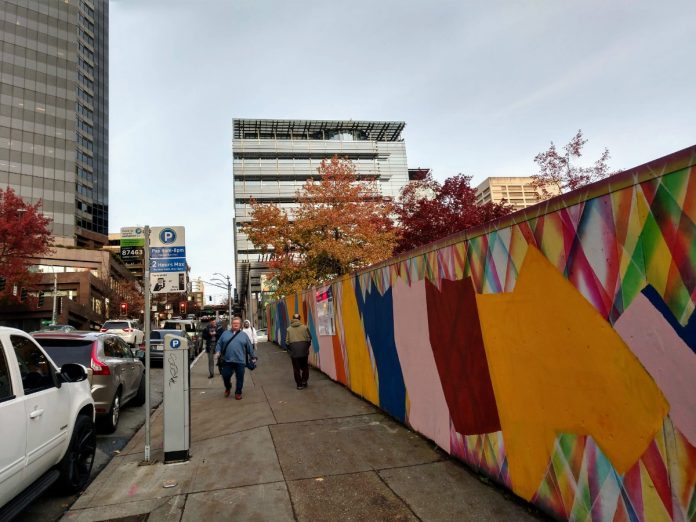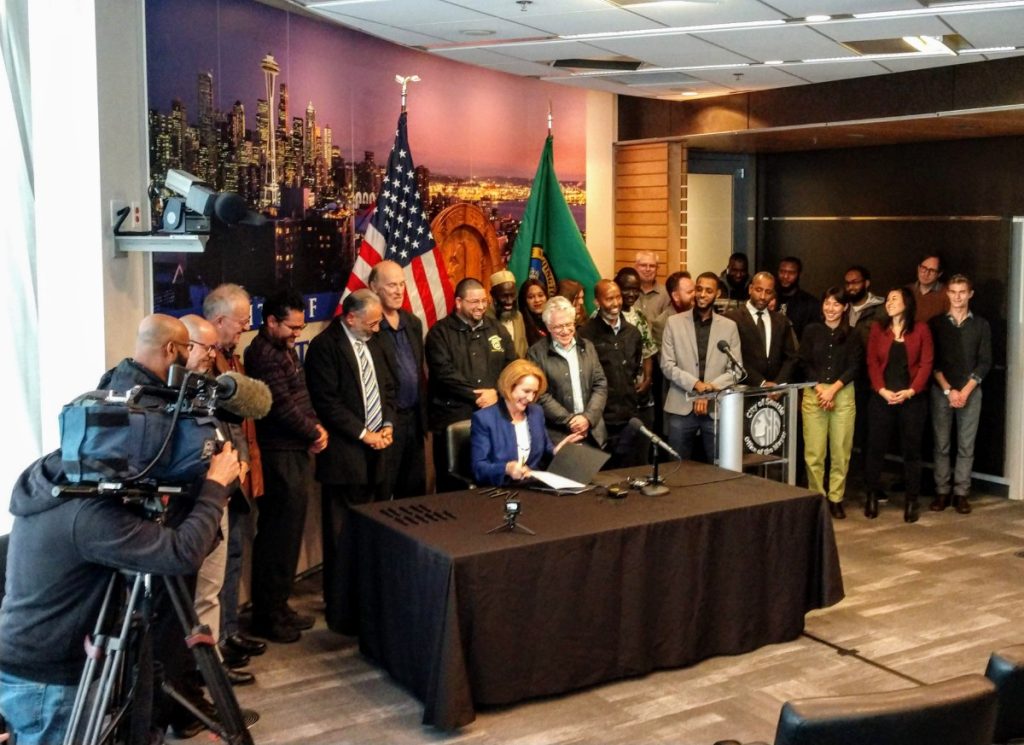
The Seattle City Council passed next year’s budget Monday and added a flurry of amendments making the Mayor’s budget more progressive and heed advocates like the Move All Seattle Sustainably (MASS) coalition. Funding the progressive priorities is a ridehailing fee hike of 51 cents per trip and one-time revenue from the sale of the publicly-owned Mercer Megablock in South Lake Union to a private developer planning a biomedical campus.
The Seattle City Council moved around about $25 million in changes to Mayor Jenny Durkan’s $6.5 billion budget–largely to boost affordable housing, homelessness services, and infrastructure for people walking, rolling, and biking. The passage of Initiative 976 (cutting car tabs to $30 and putting Sound Transit’s motor vehicle excise tax in limbo) also hangs over the budget like a cloud. If the initiative isn’t struck down in court the city council may need to come back to shuffle the decks next year and plug some budget gaps the initiative created. The City of Seattle and other localities were in court Tuesday seeking an injunction, and we should hear shortly if that was successful. (Spoiler: It was!)
One big change was in how those Mercer Megablock proceeds were spent. The city council opted to replace the Mayor’s middle-income housing initiatives with a higher priority for affordable housing. Gone is a homeownership assistance fund and a fund for homeowners to create accessory dwelling units. Instead more of that money will go toward shovel-ready affordable housing. Overall, the budget also dedicates more than $100 million to homelessness services for the first time ever.
Another consequential move was the addition of a proviso championed by Councilmember Teresa Mosqueda requiring the City planning department do a racial equity analysis on single family zoning and study ways to add density in those areas. That proviso was included in our budget call to action. The racial equity study could lay the groundwork for another pass at reforming residential zoning in our city.
Tiny house villages also got a funding boost. Mayor Durkan had been a proponent of tiny homes to house homeless people, but backed away–deterred perhaps by the vocal neighborhood pushback to tiny house villages at some sites. On the campaign trail, Mayor Durkan promised 1,000 new tiny homes in year one, but ended up building only 73 in her first year.
Fare Share Plan Enacted
Seattle’s 75-cent total fee is leaps ahead of many cities browbeaten by the lobbying might of the ridehailing industry, but it’s on par with Chicago and still two dollars short of New York’s fee. Under the Mayor’s “Fare Share Plan,” a portion of the fee will be spent protecting ridehailing drivers’ rights with a new “Driver Resolution Center” and a minimum wage study to ensure drivers make minimum wage after factoring in expenses like vehicle maintenance. The rest will be split between affordable housing and transit. The Mayor signed the Fare Share Plan into law at a press conference at city hall at 3:30pm yesterday.

The Mayor intended the Center City Connector Streetcar project to be the first on the transit list. Despite some opposition, most notably from perennial streetcar critic Councilmember Lisa Herbold, the bulk of the streetcar funding is intact, although the city council did nibble around the edges to fund other transit priorities. The streetcar money remaining should be adequate to satisfy the feds and secure the Small Starts grants on which the project relied, with the project now resting on the next city council’s shoulders.
Sawant Dissents Saying Budget Must Be More Progressive
In her tenure, Councilmember Kshama Sawant has voted against every budget and this time was no different. While she did back amendments aimed at making the budget more equitable, Sawant said overall the budget tinkers at the margins rather than fully embracing the project of bringing about racial and socioeconomic equity.
Even with Sawant’s dissent, the budget meeting was convivial and mostly lacking for drama. Beyond the ridehailing fee, Councilmembers opted to fight another day rather than wage the fight for progressive revenue this year. The fallout of the aborted 2018 employee hours tax or “head tax” helped coax four members–Councilmembers Mike O’Brien, Bruce Harrell, Sally Bagshaw, and Rob Johnson–into retirement.
Sawant, Herbold, and Councilmember Debora Juarez, meanwhile, went into the election with the mindset they’d have to scrap and fight an uphill battle to keep their seats. Instead, Herbold and Juarez waltzed, with comfortable double digit leads and Sawant also coasted to victory–rollercoaster style with an initial election night scare in which she trailed by 8.5 points before getting a powerful boost in late returns. Three of the new councilmembers–Tammy Morales, Dan Strauss, and Andrew Lewis–seem amenable to raising new revenue via corporate taxes given that Amazon and friends spent mightily trying to block them.
This could set up a showdown for next year with more progressive revenue on the table, potentially a head tax or a payroll tax or a hybrid like was originally proposed last year. That revenue could fund bus lanes, protected bike lanes, sidewalks, and affordable housing, all of which remain underfunded even with the boost in next year’s budget.
MASS Coalition Scores Some Big Wins
The MASS Coalition won some early wins and added some more victories in the final budget. Seattle Greenways had a great rundown of eight wins, including:
- $10.35 million increase for bike routes. That money will be spent providing a much needed boost to the all ages and abilities bike network in South Seattle, on the Georgetown to South Park Trail, the Beacon Avenue Trail, or a protected bike lane between Judkins Park and Mount Baker on MLK Jr Way S.
- $11 million increase for walking and rolling routes–$4 million of that is for sidewalk construction and $7 million is for accessibility improvements like curb ramps.
- $3.76 million making Thomas Street a true people street as was originally envisioned in post-viaduct and Seattle Center Arena planning.
- Active Transportation Coordinator for Seattle Public Schools guiding safe routes to school implementation and planning.
- $300,000 to continue SDOT’s transportation equity program.
- Duwamish Longhouse crossing was funded to the tune $500,000 to make sure a dangerous road doesn’t block access to this vital cultural resource.
- Home Zone Pilot is a go thanks to $350,000. Seattle Greenways spearheaded the home zone concept as a cost-effective way to add safe pedestrian access to streets without sidewalks. Traffic calming measures help people in all modes share the street.
MASS also had some disappointments with the omission of the coalition’s requested safe routes to school funding increase and a resolution to improve Complete Streets policy. The resolution would have directed the Seattle Department of Transportation (SDOT) to operationalize Complete Streets policy and officially switch Level of Service (LOS) standards to people rather than cars moved. There’s always next year.
Police Continue to Be Priority for Budget Increases
Another point of contention was how much to invest in policing versus restorative justice. The Seattle People’s Party has pressed the City toward deeper reform of a troubled police department still under the cloud of a federal consent decree. The “social justice package” the Seattle People’s Party advanced passed and former mayoral candidate Nikkita Oliver thanked the city council for adding in that funding, which invests in programs like Creative Justice arts program and LEAD (Law Enforcement Assisted Diversion). LEAD is one of those programs that everyone speaks glowingly about and yet is never funded at the level all the praise indicates and which would allow it to have a bigger impact. Mayor Durkan’s original budget proposal did not include any additional money for LEAD, a clear break from the council where every single councilmember supported an increase.
The city council didn’t tackle the fundamental issue of whether public safety spending should be centered on status quo policing, but they did find funding for the social justice package by shifting a few things around.
The city’s revenue forecasts continue to yield very little in new revenue, tracking with a projected economic slowdown. Next year, when the brand new city council considers its 2021-2022 budget, general fund spending is likely to be even more constrained, making every dollar count in this budget.
Update: A spokesperson for Mayor Durkan reached out with this comment: “Mayor Durkan continues to be a supporter of tiny house villages and proposed $1.2 million for them in her budget. Also, in last year’s budget, she added caseworkers to each village to increase support services and assistance in helping individuals transition to permanent housing. The data is clear that increased services and performance has led to better outcomes for people experiencing homelessness. Mayor is very supportive of working with Council to add additional resources for tiny house villages/enhanced shelter. Both enhanced shelters and tiny home villages are exiting people into permanent housing.”
Doug Trumm is publisher of The Urbanist. An Urbanist writer since 2015, he dreams of pedestrian streets, bus lanes, and a mass-timber building spree to end our housing crisis. He graduated from the Evans School of Public Policy and Governance at the University of Washington in 2019. He lives in Seattle's Fremont neighborhood and loves to explore the city by foot and by bike.

